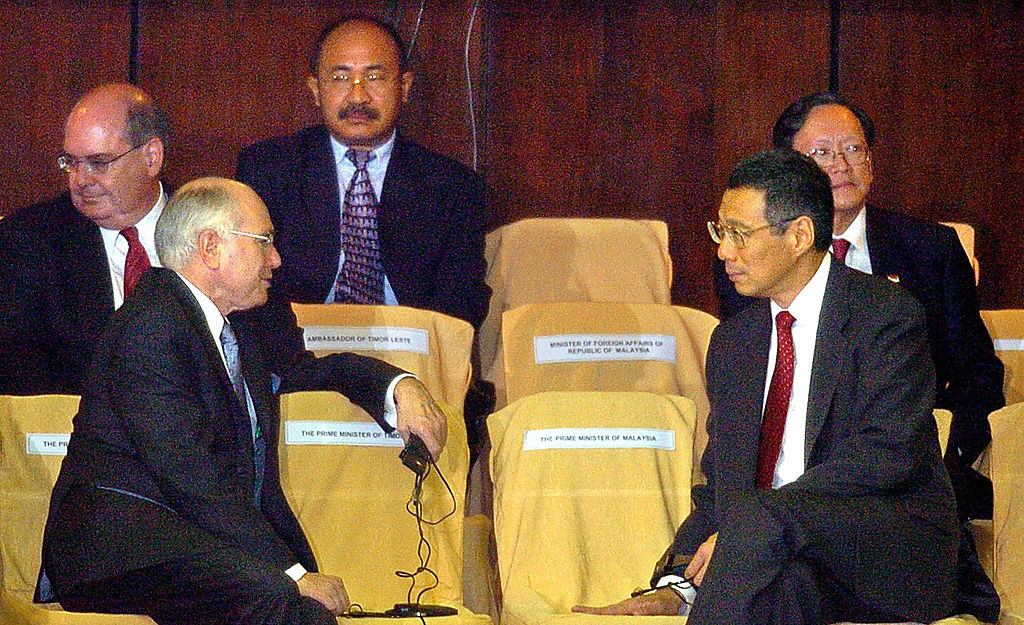Last month, a mini fracas broke out about the symbolism of Anthony Albanese citing a royal visit as cause for missing the Indonesian presidential inauguration.
As experts like Greg Fealy have noted, the impact on the bilateral relationship with Indonesia is likely to be limited. After all, ties are already in good shape, with a landmark defence cooperation deal and a trade agreement both inked in the last five years. Perhaps the relationship is not, after all, “condemned to crisis”.
This more positive trendline can be seen by comparing the political backdrop of the previous four inaugurations attended by Australian prime ministers.
In 2004, when Susilo Bambang Yudhoyono was inaugurated for a first term, the bilateral relationship was still recovering from the 1999 East Timor crisis. John Howard was still dogged by his ill-considered 2002 comment that Australia would consider pre-emptive strikes on terrorist targets in Southeast Asia. And controversy bubbled over whether Canberra and Jakarta would strike a new security pact.
In 2009, a new controversy over immigration clouded Kevin Rudd’s attendance at SBY’s second term inauguration. One headline described Rudd’s visit as a “24-hour mission to help ease Australia’s asylum seeker crisis”.
The politics surrounding Jokowi’s inaugurations in 2014 and 2019 were less tumultuous. Still, both Tony Abbott and Scott Morrison had things they wanted from Indonesia. Abbott in 2014 needed to deliver on a pledge of a foreign policy that was “more Jakarta, less Geneva” and he wanted to be sure that Jokowi would attend the G20 summit hosted in Brisbane. Five years later Morrison was seeking to finalise agreement on the Indonesia-Australia Comprehensive Economic Partnership Agreement (IA-CEPA).
Making the effort to sit among this group is the most powerful way to dispel a perception that Australia is an “Anglosphere” country that is not of the region.
Fast forward to 2024, and Albanese could be forgiven for thinking that this time the inauguration was skippable. It is narrowly true to say that the Indonesian presidential inauguration is not a trip that an Australian prime minister must make – especially when bilateral ties are good.
But this narrow perspective misses the fact that the biggest impact of skipping the inauguration might not be on the bilateral relationship at all, but rather, the opportunity for Australia to symbolically demonstrate that it is part of the region, not an “external power”. Most countries – including China, the United States, South Korea, Japan and India – do not send leader-level representatives to the inauguration. (For the last two inaugurations, China has sent its Vice President).
The countries who do send leaders are mostly Indonesia’s closest neighbours: Malaysia, Singapore, Brunei, the Philippines, Timor-Leste and Papua New Guinea. Making the effort to sit among this group is the most powerful way to dispel a perception that Australia is an “Anglosphere” country that is not of the region. Australia’s attendance is meaningful, not because it is expected, but precisely because it is unusual among non-ASEAN countries.

In his memoirs, Howard recalls that he travelled to the inauguration “on impulse” and that it was his decision to attend the inauguration that prompted other heads of government from neighbouring countries to attend. Notably, it was Howard who responded on behalf of all foreign representatives in a meeting with the newly inaugurated SBY, expressing best wishes for his presidency. Speaking at the time, Singapore’s Foreign Minister George Yeo described Howard’s decision to attend as a “nice touch”. It was also praised by SBY’s then foreign policy advisor, Dino Patti Djalal as “a very good early step in bilateral relations between Indonesia and Australia.”
Considering this history and context, what does Albanese decision not to attend the inauguration tell us about his world view? It’s doubtful that this was a deliberate decision to deprioritise Indonesia, or a statement about Prabowo, as some have contended. Canberra has eagerly embraced Prabowo, hosting him for a visit ahead of the inauguration and signing a new defence agreement with him in his capacity as defence minister.
Rather, Albanese’s decision suggests complacency about Indonesia, and Australia’s place in the region. Speaking at the Quad Summit in the United States, Albanese said “I have prioritised the visits that I have to make”. Implicit in this statement is that he will not go above and beyond to make the kind of symbolic, leader-driven gestures that carry diplomatic weight. This is a deficit that even the most active and competent of foreign ministers cannot remedy.

